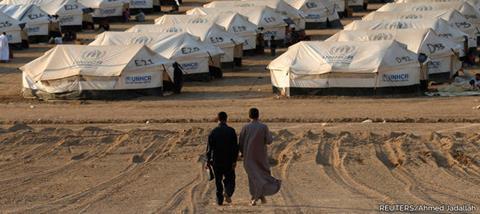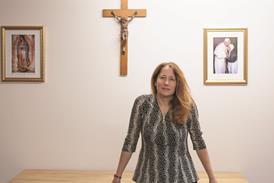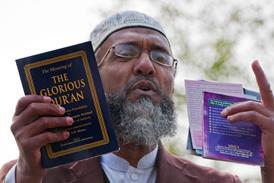
When insurgents overran Mosul, Iraq’s second largest city, few Western onlookers would have been aware that it stands on the ruins of Nineveh, the destination of the Bible’s most unwilling prophet, Jonah. Iraq has longstanding ties to biblical history and, until recently, a strong Christian community.
Today, however, the Christians of Iraq face a catastrophe ominously typical of their recent history of persecution. When Mosul fell to the Islamic State of Iraq and Levant (ISIS) on 6th June, the city’s last remaining Christians, who are thought to have numbered around 35,000, were among the half a million people reported to have fled the city. As open war between the Shia and Sunni Islamic factions takes place, Christians are one among a number of groups who have found themselves caught up in the turmoil.
Yet the story of displaced Iraqi Christians goes back much further. And that sad history of persecution includes the untold story of the fall of Baghdad’s Al-Doura neighbourhood. It’s a story that the Western Christian Church needs to hear.
A ONCE-STRONG CHRISTIAN COMMUNITY
Nicknamed ‘The Vatican of Baghdad’, Al-Doura was a Christian neighbourhood in south-west Baghdad, home to a plethora of churches and Christian institutions. A visitor walking its shaded streets a few decades ago would have encountered eucalyptus trees, oleander shrubs and neat gardens, with church bells chiming in the background. But today its bullet-marked streets tell a story of massive upheaval and the decimation of a once-thriving Christian population.
The area’s Christian identity originally developed after the British presence in Iraq came to an end in 1955. As part of their agreements on departure, Britain offered resettlement in civilian life to members of the RAF Levies – a force made up primarily of local Christian Assyrians in order to relieve the British and Indian troops.
"Iraq has longstanding ties to biblical history and, until recently, a strong Christian community"
Houses sprang up in an earmarked part of the land called Al-Doura, which sat on a palm-lined stretch of the River Tigris as it winds south of Baghdad. A huge nearby oil refinery provided jobs for many of Al-Doura’s new-found inhabitants.
The community grew to become a peaceful conglomeration of Christians from several different denominations. Members of the Assyrian Church of the East were the majority, followed by Catholic Chaldeans. Rev Ishmael Tamras of the Assyrian Church of the East in London, says: ‘Immediately after our relocation we began building our churches and places of worship. Two churches were built: St George’s for the Assyrians and St John’s for the Catholic Christians. The chanting and chiming of bells ascended from various ends of Al-Doura.’
In 1961, the Chaldean Catholic Church purchased 20 acres (81,000 square metres) of land and immediately started to build St Peter’s Seminary, which took three years to complete. Five more churches and a monastery were built by different Christian denominations.
Andrious Khamoo, a London-based businessman and restaurateur, was one of the neighbourhood’s earliest residents. ‘Those were days of happiness,’ he says. ‘Most people were poor by today’s economic standards, but they were rich in moral values, family relations and social traditions. It was customary for people to exchange social visits. We all lived just like members of one big family. People loved Al-Doura to the point of infatuation.’
The booming neighbourhood attracted more middle-class families and became one of the biggest Christian communities in Iraq. At its zenith, it housed some 150,000 Christians in an area the size of San Francisco.
Al-Doura continued its progress and growth under the shadow of Saddam Hussein’s almost secular state. Non-Christian families moved into the area. Adherents of all faiths were able to coexist in relative peace, creating a tranquil interfaith relationship. Ironically, even under Saddam’s reign of terror and despicable rule, Christians felt relatively safe.
SURVIVING IRAQ’S WARS
Border hostilities between Iran and Iraq flared in 1980 and Saddam launched a full-scale invasion of Iran. The war lasted for eight years, making it the 20th century’s longest conventional war. Al-Doura was transformed by the bloody conflict, which permanently altered the course of its history.
Coffins of soldiers killed in battles arrived in the area almost daily. Grieving parents and relatives would gather around to mourn their loved ones. Ashur Ninos, a teenager at the time, says that the neighbourhood became ‘a funeral city’. He remembers: ‘Almost every day a van would arrive with a casket draped in an Iraqi flag. We could hear the screams and wailing of the parents. ‘One day they brought a coffin of a soldier. His mother’s cries of anguish seemed almost powerful enough to return the dead to life. When she opened his coffin to have a final look at her son, she was shocked to see that it was not him. After two days he returned from the front.’
Two years after the end of the Iran-Iraq war, Al-Doura found itself facing another catastrophe. On 2nd August 1990, Saddam invaded Kuwait. The international community unanimously condemned the invasion and demanded the immediate withdrawal of Iraqi forces.
After the failure of diplomacy, the allied ground attack began and a ceasefire took effect shortly after. Yet as a result of just four days of allied bombing, a near-apocalyptic destruction fell upon Iraqi civilian infrastructures and institutions.
Additionally, the United Nations imposed economic and financial sanctions on Iraq lasting 13 years. Those sanctions were regarded as the toughest in history. The Iraqi people were punished for the actions of an authoritarian regime over which they had no control. The economy was in tatters with high unemployment and inflation; poverty levels rose inexorably.
Rita Georges, who lived under those sanctions, says, ‘People passed their days in bitter and wearisome struggle to earn a living. The tide of life ebbed away from the Iraqi people; thousands of Christians left Iraq for better living conditions abroad. Al-Doura’s church bells rang timidly. Many inured themselves to the defeat and to the pitiless unfairness of life.’
CHRISTIANS CLINGING ON
Despite this gloom, the pontifical Babel College for Philosophy and Theology commenced its first term in October 1991. It was the only Christian theological faculty in Iraq and rapidly became an important educational resource for priests, monks, nuns and lay people. A Christian institute and cultural centre opened soon afterwards.
Once Saddam had defeated the Iraqi uprising, he deliberately allowed Sunni hard-liners to live in Al- Doura in order to defend Baghdad’s southern flank in the event of another rebellion by Iraq’s Shia-dominated south. It became Baghdad’s buffer zone from the huge Shia heartland. The neighbourhood became predominantly Sunni in the process, while Christians were reduced to small enclaves.
The nail in the Christian coffin came with the invasion of Iraq by allied forces in 2003, when Saddam was ousted. Soon after the invasion, a wave of unprecedented cross-sect terror ignited, with the main Sunni and Shia groups looking to exterminate each other. These groups viewed the American-led invasion as a Christian crusade and Iraqi Christians as its supporters and collaborators. The persecution of Christians took the form of bombing, kidnapping and indiscriminate killing.
A REIGN OF PERSECUTION
As Iraq continued to lose all semblance of order, Al-Doura steadily fell under the sway of the insurgents and became a hornet’s nest of sectarian violence. The remaining Christians began to abandon their homes en masse.
Iraqi Christians have no tribal structure, depriving them of the blood ties under which other Iraqis bind together in times of trouble. As such, they have never formed self-defence militias. Christianity returned to its roots as the religion of the persecuted.
Archbishop Habib Jajou recalls how he carried a pistol for protection and armed volunteers guarded their church. ‘Every day I prayed to the Lord: “Do not let me shoot anyone.” People in my parish were killed by criminals for their money. Even my doctor was killed just because he had a new car. At sundown everyone stayed in their homes. One day a piece of paper was pushed under the door of the parish house; it requested $10,000 or the church would be bombed.’
"One day a piece of paper was pushed under the door; it requested $10,000 or the church would be bombed." #iraq
Some of Al-Doura’s churches were forced to remove crosses from their domes. Muslim extremists climbed onto church roofs and physically ripped crosses off. In the Chaldean Church of St John, parishioners themselves decided to move the cross to a safer place following repeated threats.
The sheikh of the Al-Noor mosque was often seen touring Al-Doura and instructing Christian families to pay 250,000 Iraqi dinars ($190) as jizya – Islamic tax – because they were not Muslim. Families that could not pay this sum were told to send one family member to the mosque on Friday to announce their conversion to Islam. Those who refused to do so were told to leave their homes immediately, leaving their belongings behind because they belonged to the mosque.
THE AL-QAEDA TAKEOVER OF AL-DOURA
As foreign Islamic fighters flooded Iraq, the neighbourhood became one of Baghdad’s most notorious Al-Qaeda strongholds, with the movement designating it a ‘mini-Caliphate’. Lt Col James R Crider observed that ‘Al-Doura was a perfect breeding ground for the insurgency’. It functioned as an important transit point for car bombs and other weapons flowing into Baghdad. American soldiers described it as ‘the most dangerous place in Iraq’.
In order to command better control of the area, the US Army occupied Babel College and used it as a command post. Father Nadheer Dako, parish priest of the Chaldean Catholic mission in London says that this controversial move further increased resentment towards Iraqi Christians. ‘They were seen as America’s fifth column, although they did not hand over the building to the Americans. Violence against Al-Doura’s Christians increased in its ferocity. We found ourselves in Baghdad offering sanctuary to the displaced people. We helped them to reach safer areas. Christians were seen as soft targets that would pay or leave their homes rather than retaliate.’
The international Church was largely unaware of the desperate plight of the once-strong Christian community, although some efforts bore fruit. Iraqi Christians in Need (ICIN), a UK-based charity established by Iraqi Christians to raise awareness in Western countries of their plight, launched the Doura crisis appeal in 2007. It raised more than £30,000 for the people of Al-Doura, who had lost their homes and had ended up sleeping in churches and schools in other parts of Baghdad.
US troops eventually stormed the local Sunni paramilitary forces, known as the Sahwaat (the Awakening), and managed to subdue the neighbourhood. One-third of the 900 shops in the main market reopened. Some Christian families, who had fled Al-Doura, reluctantly returned. Two of Al-Doura’s original seven churches were reopened, but were sparsely filled. Recent events in northern Iraq suggest they have many reasons to be doubtful of their future security.
THE HISTORY OF THE SUNNI-SHIA CONFLICT
The historical background of the Sunni-Shia conflict lies in the schism that occurred when the prophet Muhammad died in the year 632, leading to a dispute over his successor.
Shias believe that, in accordance with the command of God, Muhammad divinely ordained his cousin and son-in-law Ali to be the next caliph, making Ali and his direct descendants Muhammad’s successors. Ali married Fatima, the prophet’s daughter.
Sunnis, however, believe that leadership of the faith passed first to the prophet’s closest companions, and that a successor should be appointed under Arab tribal tradition.
Today, the majority of Muslims in Iraq are Sunni (thought to be around 80%). Shiites make up the remaining 20%. Each side views the other as apostates, and extremists are determined to eradicate each other.
IS THERE HOPE FOR CHRISTIANS IN IRAQ?
Eleven years after the fall of Saddam, Iraqi Christians have dwindled from more than a million to as few as 200,000. Those unable to join the Iraqi diaspora in Europe and America fled to sister communities within Iraq. Many Christians have resettled in a town called Ankawa, in northern Iraq. And just as in the 1950s, they have rapidly built churches and religious institutions.
According to the Chaldean Archbishop of Mosul, Emil Nona, military interventions have only ever worsened the situation for Iraqi Christians. ‘The problems sooner or later explode again in a more devastating way. A common language and instruments of dialogue must be found with patience that engages all Iraqis.’
"A common language and instruments of dialogue must be found with patience that engages all Iraqis."
As the world has witnessed the fragile democracy of Iraq being threatened by religious tribalism, the Christian population may have cause to feel that its story is being forgotten. Chaldean Catholic patriarch Louis Sako says of the plight of Iraqi Christians: ‘We feel forgotten and isolated. We sometimes wonder, if they kill us all, what would be the reaction of Christians in the West? Would they do something then?’
God once sent an unwilling prophet to help Nineveh. Perhaps the story of Al-Doura will be a wake-up call to believers in the West that their brothers and sisters in Christ are now more in need than ever.
TIMELINE OF IRAQ HISTORY
1920 Britain creates state of Iraq in the aftermath of WW1
1932 Iraq becomes an independent state
1958 The monarchy is overthrown in a military coup. Iraq is declared a republic
1963-68 The ruling Ba’ath Party is overthrown but regains power with General al-Bakr as president
1979 Saddam Hussein succeeds al-Bakr
1980-1988 The Iran-Iraq war
1988 Thousands are killed when Iraq attacks the Kurdish town of Halabja with poison gas
1990 Iraq invades Kuwait, prompting the first Gulf War
1991 A US-led military campaign forces Iraq to withdraw in February. A no-fly zone is established along with economic sanctions
1998 The US and UK launch a bombing campaign, Operation Desert Fox, to destroy the country’s weapons programme after Iraq ends cooperation with UN Special Commission
2002 UN weapons inspectors return to Iraq
2005 Iraqis vote for the first full-term government and parliament since the US-led invasion
2006 Saddam is executed for crimes against humanity. More than 34,000 civilians are killed in violence during the year
2011 US completes troop pullout
2014 The Islamic State of Iraq and the Levant (ISIS) seizes Iraq’s second city of Mosul. Tens of thousands flee amid reports of atrocities. Iran and the US offer assistance



























